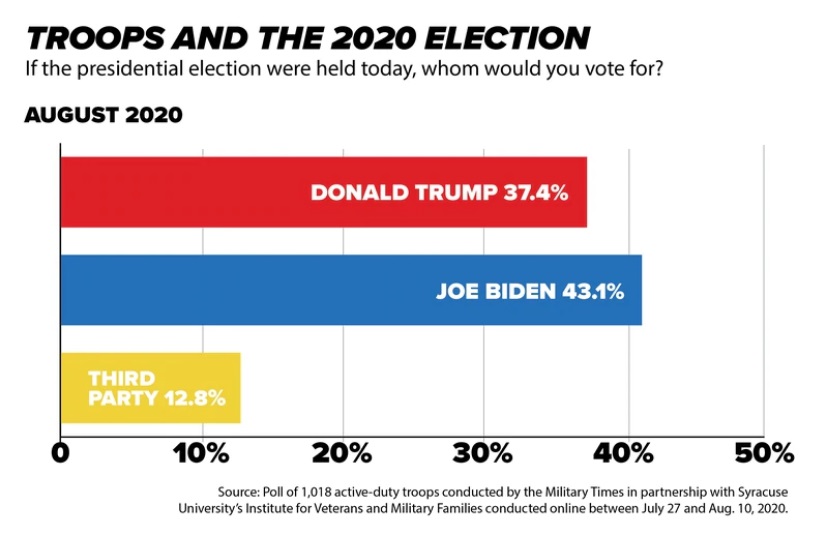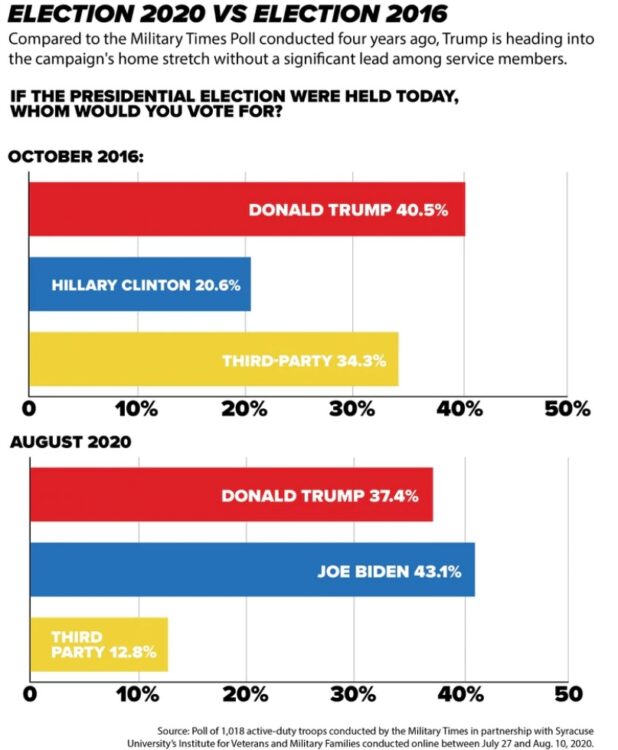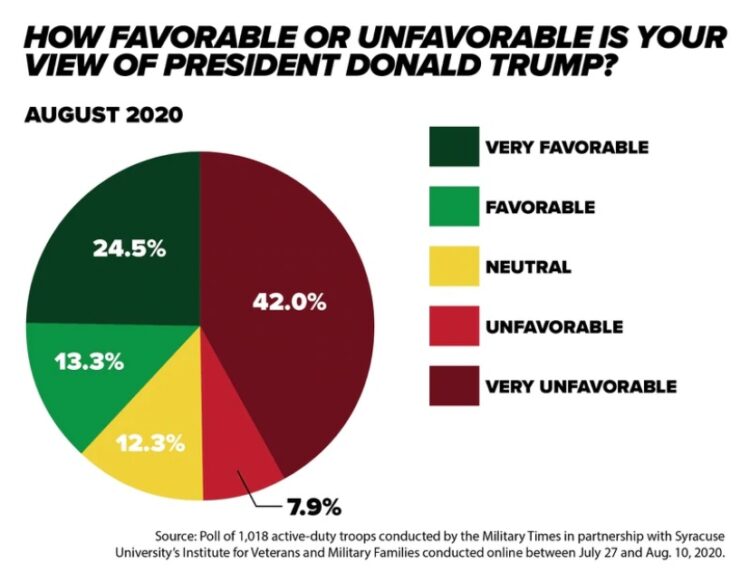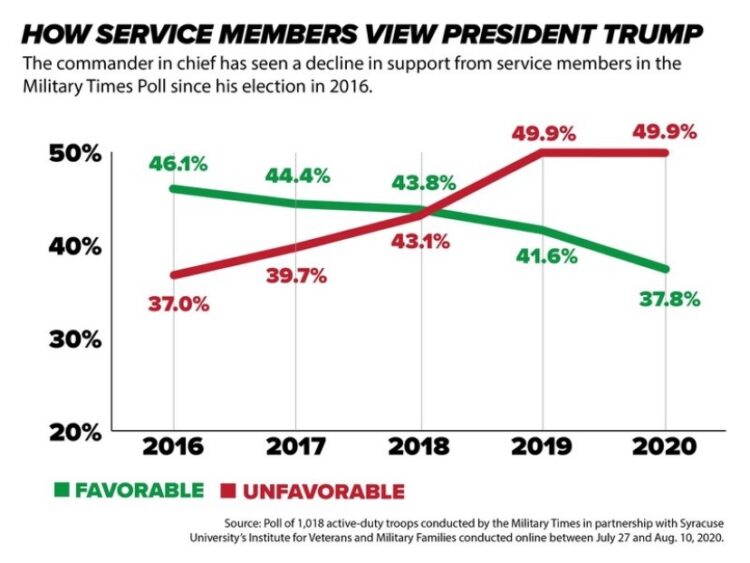A new extensive poll of military members shows a continued decline in active-duty service members’ views of President Trump and a slight but significant preference for former Vice President Joe Biden in the upcoming November election.
The results by Military Times appear to undercut claims from the president that his support among military members is strong thanks to big defense budget increases in recent years and promised moves to draw down troops from overseas conflict zones.
But the Military Times Polls, surveying active-duty troops in partnership with the Institute for Veterans and Military Families (IVMF) at Syracuse University, have seen a steady drop in troops’ opinion of the commander in chief since his election four years ago.
In the latest results — based on 1,018 active-duty troops surveyed in late July and early August — nearly half of respondents (49.9 percent) had an unfavorable view of the president, compared to about 38 percent who had a favorable view. Questions in the poll had a margin of error of up to 2 percent.
Among all survey participants, 42 percent said they “strongly” disapprove of Trump’s time in office.
The unfavorable number matches what an earlier Military Times Poll found in late 2019, while the favorable total slipped from just under 42 percent last year. In a poll conducted at the start of Trump’s presidency, 46 percent of troops had a favorable view of him, versus 37 percent who had an unfavorable opinion.
Even with the steady decline, Trump’s popularity in the poll remains better than former President Barack Obama. Obama had a 36 percent favorable rating and a 52 percent unfavorable rating in a January 2017 Military Times poll.
Still, the dipping popularity among troops — considered by Republican Party leaders to be part of the base of Trump’s support — could prove problematic for the president in the upcoming election.
Among active-duty service members surveyed in the poll, 41 percent said they would vote for Biden, the Democratic nominee, if the election was held today. Only 37 percent said they plan to vote to re-elect Trump.
Another 13 percent said they plan to vote for a third-party candidate, and nearly 9 percent said they plan on skipping the election altogether. About 40 percent of troops surveyed identified as Republican or Libertarian, 16 percent Democrats, and 44 percent independent or another party.
“It’s fair to say that Trump is not as popular as Republican nominees have been in the past among this group,” said Peter Feaver, a White House adviser to former President George W. Bush who now works as a political science professor at Duke University. “The bottom line is that in 2020, Trump can’t be claiming to have overwhelming support in the military.”
The splits between officer and enlisted views within the poll are notable. More than 59 percent of officers said they have a poor view of the president, with more than half saying they strongly disapprove.
Among enlisted respondents, 47 percent said they have an unfavorable view, and nearly 39 percent a favorable view. Enlisted views of Trump’s performance in office have consistently been more favorable than those of officers in the poll over the last four years.
Feaver said that could be due to officers’ predisposition to long-term military careers, and a negative reaction to Trump’s comments against the “deep state” and other career federal positions.
The national Gallup Poll of Trump’s job performance conducted just before the political conventions found that 55 percent of Americans had a negative view of the president, against 42 percent who approved of his work. Feaver said with any poll of service members, it is important to remember that those broader public views also play a factor.
“The military tends to follow broad shifts in the opinion of the American public, albeit trending more conservative,” he said. “So as the country moves away from Trump, you’ll see that in the military too.
Even with the president’s lower popularity, the most recent poll respondents were more likely to hold a favorable view of Trump’s handling of military issues (48 percent) than an unfavorable one (46 percent).
Still, the latest poll found significant disagreement among active-duty respondents with several controversial presidential policy statements from recent months.
Only about 17 percent of those surveyed felt the White House has properly handed reports that Russian officials offered bounties for Afghan fighters to target and kill American troops, an issue Trump has dismissed as unreliable intelligence. Nearly 47 percent disagreed with his statements.
Similarly, almost 74 percent of those surveyed disagreed with Trump’s suggestion that active-duty military personnel should be used to respond to civil unrest in American cities, including the ongoing racial equality protests. Only about 22 percent supported the president’s idea.
That contrasts with half of the polls respondents’ support for using National Guard troops to help address civil unrest connected to the protests.
Troops agreed with Trump’s assessment of China as a national security threat (nearly 87 percent called it a significant concern) but ranked Russia (81 percent) well above Iran (58 percent). Only about 21 percent of troops saw immigration as a significant national security issue, but 48 percent identified white nationalists as a concern.
Nearly half of troops surveyed said the U.S. military force level in Germany should remain the same, despite Trump’s recent moves to drawn down American military personnel levels there. Another 24 percent say they believe troop levels in Germany should be increased.
Feaver said those policy disagreements “do not necessarily show that troops are beginning to think more like Democrats, but instead that they aren’t thinking like Trump Republicans.” He also cautioned that the stronger support for Biden in the poll than Trump may be more a reflection of dissatisfaction with the president than a political shift within the ranks.
Still, he called the numbers showing a close race in military voting between the two surprising.
In the 2016 Military Times Poll, nearly twice as many respondents said they planned to vote for Trump than then Democratic nominee Hillary Clinton.
Exit polls from the election showed a similar margin after election day.
A 2012 Military Times Reader Survey — conducted in a non-scientific fashion — showed respondents favoring then Republican presidential nominee Mitt Romney by a 2.5-to-1 margin.
Maury noted that the poll results are “a snapshot in a point of time” and that voting views can still shift in the two months between now and the election.



